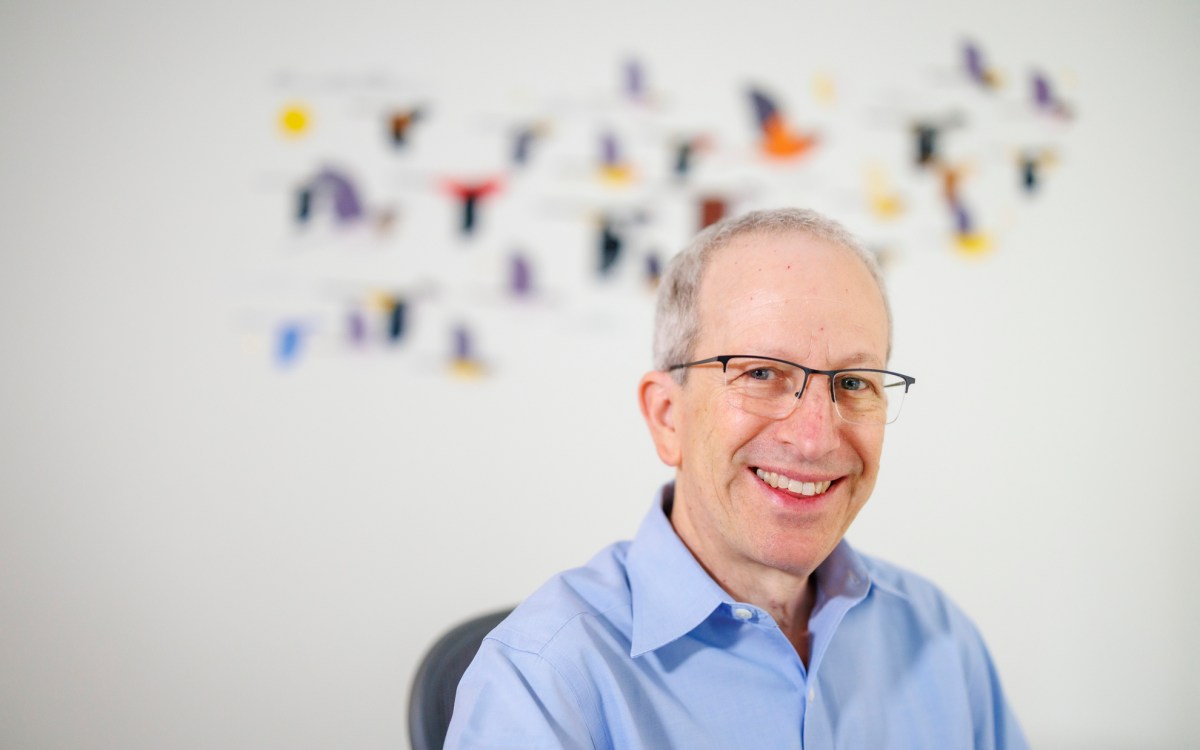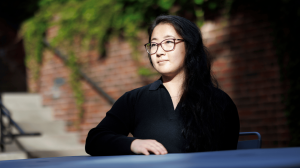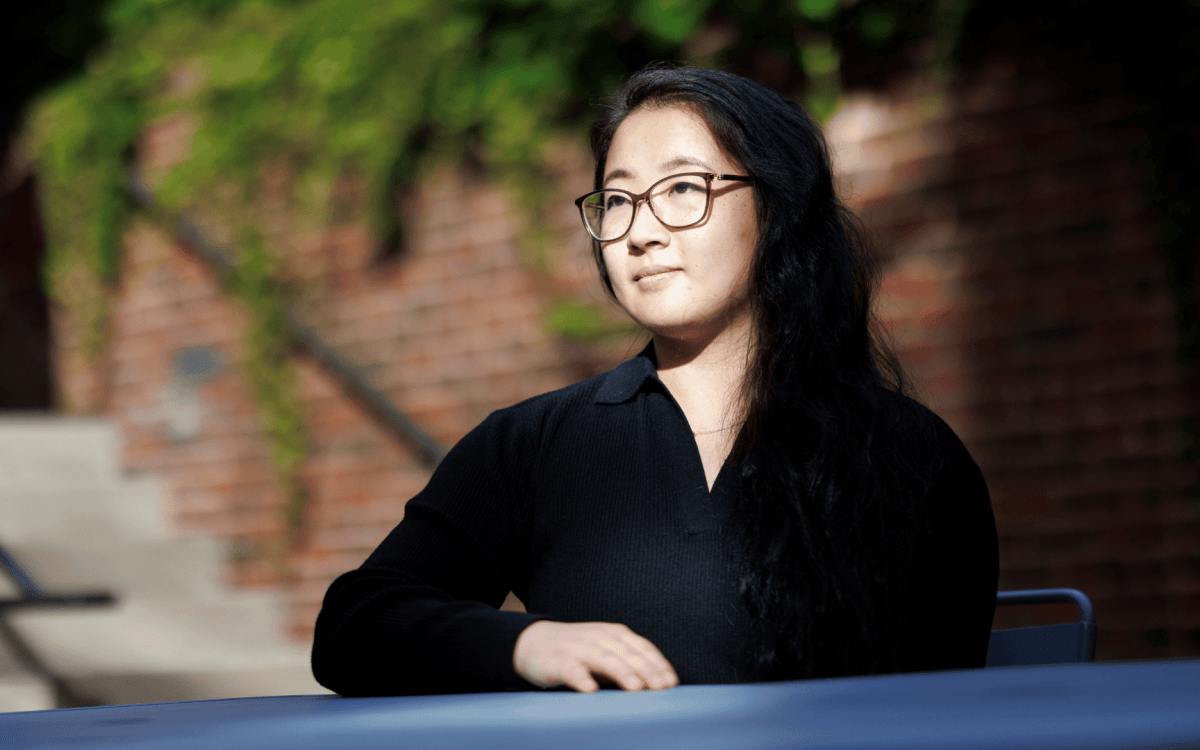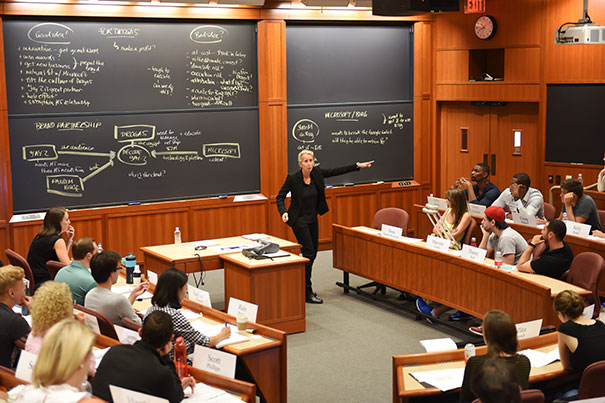
Harvard Business School Professor Anita Elberse is leading a new program that pairs NBA players with M.B.A. student mentors to help young athletes up their business game.
Photo by Kwame Owusu-Kesse/K.KESS Photography
The NBA-HBS career connection
In novel new program, basketball players and student mentors work together to build business acumen
Years ago, when children were asked what they wanted to be when they grew up, they often answered firefighter, astronaut, or teacher. Today, they’d likely say pop star, tech entrepreneur, or professional athlete.
And why not be a pro athlete? Famous and admired, many get paid a lot of money to have fun playing sports. They devote years to perfecting their skills and competing to become the best. And given the long odds of making it, getting drafted by a pro team, signing a contract, or a getting a sponsorship deal can feel like winning the lottery.
But for every savvy athlete-business whiz like basketball stars Magic Johnson or LeBron James, there are hundreds more who squander their earnings by getting involved in sketchy investment schemes, bankrolling risky ventures like restaurants, hiring family and friends for nonessential jobs, or simply living beyond their means.
A widely cited 2009 Sports Illustrated story reported that many NFL and NBA players faced significant financial strain within a few years of retiring from their sports. The NBA doesn’t maintain a record, but makes it a priority to ensure that players have access to financial education.
Whatever the number, athletes have no shortage of hangers-on eager to solicit them to invest in business ideas or fast-talking acquaintances offering to become their financial advisers. What can be in short supply are experts with sophisticated business expertise willing to share their time and knowledge to teach athletes how to make more-informed business moves.
Some Harvard Business School (HBS) students and their professor, Anita Elberse, want to change that. This fall, they launched “Harvard Business School and the NBA: Crossover into Business,” a semester-long program in partnership with the NBA that offers 10 active and recently active players a chance to develop their business acumen and explore business interests with the help of M.B.A. student-mentors.
“This is all about giving them the tools to get smarter and to make better decisions,” said Elberse, the Lincoln Filene Professor of Business Administration, who leads the program and teaches the popular M.B.A. course “The Business of Entertainment, Media and Sports.”
“I think where it started for me was the realization that many, many athletes make a lot of money during their careers; then they lose it very quickly after their careers,” said Elberse, who runs an executive education program each spring that’s attracted the likes of NBA All Star Dwyane Wade and actor/rapper LL Cool J. “The statistics are pretty sobering. So we said, can we help? We have students who are really willing to help and I think they are more trustworthy than your average person who comes out of the woodwork simply because these players are now rich.”

Graphic by Rebecca Coleman/Harvard Staff; images courtesy of the National Basketball Association
Jason Price, an M.B.A. student who coordinates the program, said he was motivated to tackle the issue by his own experience as an elite athlete in college.
“I’ve wanted to try to help solve this problem for a few years now,” said Price, who was an All-American track and field star and team captain at the University of Southern California, a perennial track powerhouse. There, he saw firsthand how successful young athletes, even in sports less lucrative than professional basketball, could come into a lot of money at a young age and face complicated financial decisions while they were unprepared to tell good ideas and advice from bad.
He was quickly on board after the NBA and Elberse partnered up and worked out the program’s concept, leveraging HBS’s considerable convening power and resources to help young stars learn to make more informed choices.
“For me, the mission has always been to create a way that athletes and entertainers can have — at their fingertips — a way to answer the business questions they have, answer the questions about their brand that helps them make an [impact] in their communities and in their lives and helps them build their platform and build their wealth” into something “that’s sustainable and something they can do on their own,” he said.
By giving players, many of whom only had one year of college before turning pro, useful information and teaching them how to evaluate business opportunities, Price said the mentors hope to ultimately reduce the financial failure rates among young athletes and help them reinvest in their communities, where they can have a major impact.
From one game to another
Free agent center Chris Bosh was intrigued by the chance to study at HBS after hearing about Elberse’s executive education class from Wade, his former Miami Heat teammate, with whom he won two NBA championships. Bosh is sitting out the NBA season while recovering from a blood-clotting illness, but has not yet retired from playing. He was released by the Heat in July.
“I’ve always taken an interest in business,” said Bosh, 33, who was drafted by the Toronto Raptors in 2003 after his freshman year at Georgia Tech. “As basketball players, that’s always one of the huge topics that come up because we come into a lot of money and we don’t necessarily know the ins and outs. Our professionalism is in basketball. And for a lot of us, we didn’t do much with education. … [HBS] attracted me because it was an opportunity to learn from one of the best institutions in the world and see if I could do it.”
Though he has financial advisers to oversee his nearly $190 million in career earnings, Bosh said in an interview that he wants to understand better what they’re doing and to explore post-playing options before diving back into the many business ventures and investment opportunities he’s presented with.
“I’ve had my failed attempts, and I’ve had a lot of them. I kind of stepped back and said, ‘Why don’t I just take this time to educate myself and really, really learn about and get at the core of what business is, how business works, and see what it is I like. Let me try to connect the dots and educate myself first before I even think about getting in the [business] game.’ Because, you know, people will take your money!” he said, laughing.
Lance Thomas, a forward with the New York Knicks, is his team’s player representative to the NBA, so, “When I saw this was happening, I wanted to be part of it.” Though Thomas, 29, likely has many more playing days ahead, he’s not taking any chances. “You can never start too early to get ready for life outside basketball.”
Chris Bosh asks a question during class.
Photo by Kwame Owusu-Kesse/K.KESS Photography
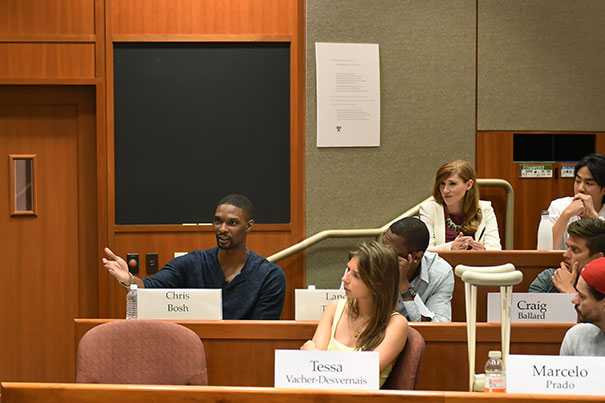
Thomas hopes to learn as much as he can now so that when he’s presented with a business proposal that looks appealing, he’ll be in a position to effectively evaluate it before getting involved.
“This whole experience is amazing, not only for me, but I’m pretty sure all the other guys feel the exact same way,” he said. “You get out of it what you put into it, so while I have the opportunity to be speaking to these guys, really picking their brains, just asking questions, I really just want to be a sponge and learn everything.”
Both men have been impressed by the students’ preparation and engagement, and by Elberse.
“You know, Anita, she’s very enthusiastic, and that’s one of the things that I love,” said Bosh. “It’s a really good feeling to be able to work with somebody like that. It makes me enthusiastic. If I don’t have my homework done, I’m like ‘All right, I gotta get this [case] study done!’”
It’s final-presentations week in the “Crossover into Business” program (a partnership with the @NBA) and we’re having a blast. 🎓🏆🏀 pic.twitter.com/yqaZU2wHrQ
— Anita Elberse (@anitaelberse) December 7, 2017
Though the time and travel demands of the long NBA season make it hard to carve out time for much beyond basketball, Thomas said completing his assignments and staying in frequent contact with his HBS mentors are top priorities.
“The mentors who I have are just so engaging, it doesn’t feel like a burden. I really look forward to our conversations. We have really good dialogue among the three of us, and I always feel like I learn something every time I get off the phone with them,” he said.
The HBS students do not receive degree credit for their participation, and the players pay nothing to be in the program. Their travel costs to and from Harvard were picked up by the league.
“That was specifically because we didn’t want cost to be a barrier,” said Elberse. “Obviously, most NBA players have a lot of money, but the players who are starting out might not, and those might actually be the ones who in the long run we really want to cater to.”
From the paint to the pit
The program works much like any Harvard M.B.A. class. The players go through a number of Elberse’s case studies, pondering pivotal issues in the careers of stars such as Beyoncé or Dwayne “The Rock” Johnson, and top media companies such as Spotify and NBCUniversal.
After a mock “reverse draft” in which each player selected two HBS students as mentors, the player-mentor teams discuss cases each week by phone or Skype. Instead of following a set curriculum, players tailor their studies to include areas they want to know more about, such as real estate investment, private equity, or establishing sports academies.
“Some have already launched a number of different businesses and are well-versed in the world of business and maybe just need a few pointers. There are others who may have never really done much in terms of university education — the ‘one and done’ type players. They may need more fundamental knowledge like ‘How do I conduct myself in a business meeting?’ or ‘Why do businesses do what they do in the first place?’ or a serious grounding in the basics of financial management,” said Elberse. “We realized everyone needed something different.”
In addition to reviewing case studies with them, the student mentors track down materials and help put the players in touch with faculty or other experts who can offer guidance. “But the rest is really up to the players,” she said.
At the end of this semester, the players will face Elberse, Price, and a panel of student mentors who will judge their analyses and answer questions about a case study. The player with the best final presentation receives a “championship” ring.
“If we see fewer people making wrong business decisions, I think that would be the ultimate measure of success for me. And I’d love for them to just feel happier about what they are doing during and after their career,” she said.
Life off the court
The NBA is active in assisting players with life off the court. The league offers classes on business and financial matters and works with players to identify the interests and skills they’ll need to make the most of their post-playing days.
“We know our guys have spent an inordinate amount of their lifetimes preparing for basketball. That’s how you become best in the world,” said Greg Taylor, senior vice president of player development for the NBA. “So what we try to focus on, from a player development standpoint, are … programs that help them to think through and prepare for that career transition after their basketball career is over.”
The league decided to partner with Elberse after Wade, now a Cleveland Cavaliers guard, talked up his positive experience in her executive education class in 2015 to other players.
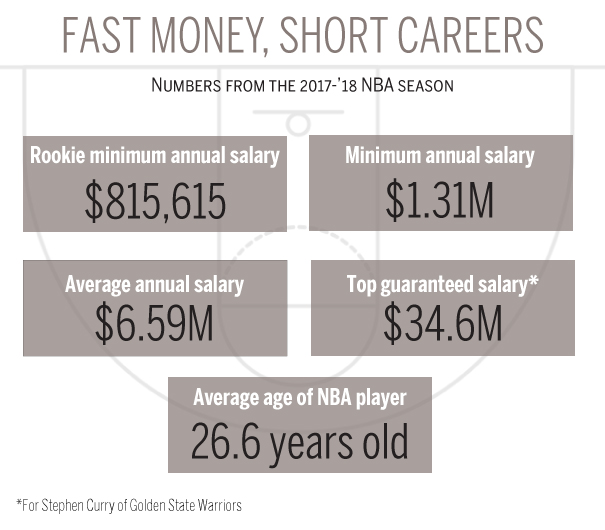
Graphic by Rebecca Coleman/Harvard Staff; source: Basketball-reference.com
While the HBS cachet and caliber of curriculum are certainly appealing, Taylor said, the ability to get top-notch, no-strings-attached instruction is a key draw for the NBA.
“One of the most important skills our guys develop very early on is how … to weed through who’s there to help and who’s a hanger-on,” and so to have “partnerships with the student mentors be about business and about helping them to transfer that skill and experience as a player — and wanting nothing in return — is absolutely a part of it.”
Next semester, the WNBA plans to enroll some of its players in the program. Elberse hopes that athletes outside of professional basketball, like those in track and field, will also participate.
Beyond ‘the cool factor’
Though HBS students serve as mentors, there is much for them to learn, too.
During a campus visit in September, the players sat in on Elberse’s class for a discussion of a case study about rap artist Jay-Z. Though they were initially just going to observe the classroom dynamic, soon they were eagerly chiming in with their thoughts on him and on a case study of NBA superstar LeBron James.
“The students learned a great deal from just seeing how the players approach a case, and how they think about someone like LeBron James … so it’s great for both sides,” said Elberse.
Price, who coordinates the program, originally selected a handful of fellow students who had athletic backgrounds, whom he hoped might be receptive to mentoring. He’s been pleased at the turnout. Nearly two dozen HBS students are on board, despite the daunting school and career obligations that second-year M.B.A.s typically juggle.
“Everyone wants to work with a professional athlete in some capacity — the cool factor. But then I’ve really seen a lot of people who want to share their expertise and share the special environment we have at HBS with the players,” said Price. “It’s a worthy cause and … exciting, so people find the time.”
Beyond the “cool factor,” working with the players offers students a valuable and rare learning opportunity.
“There is a parallel with our regular case studies. But the big difference here is that the players are essentially live protagonists — you get to study them up-close,” said Elberse.
“Many students who want to go into sports management never actually have a chance to be in touch with the talent that drives these businesses. Most of the time, they don’t have access to them,” she said. “It is a really great opportunity for our students to be in the same room with these athletes, get a sense of who they are, what motivates them, and how they look at business decisions.”
